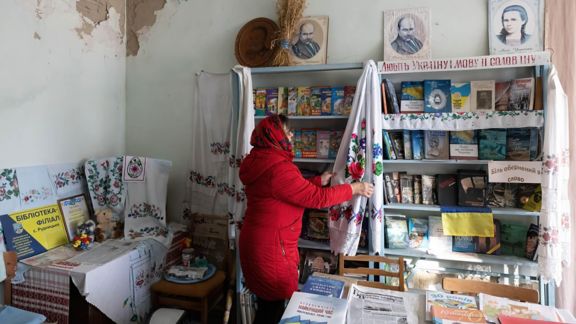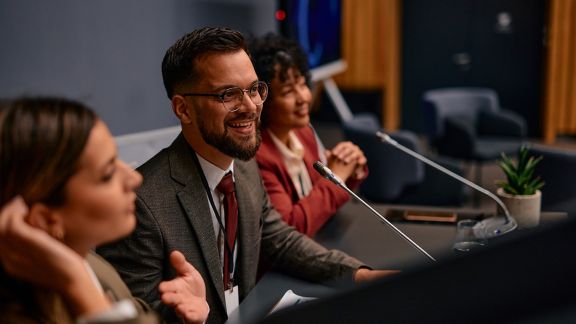Listening to Voices That Don’t Usually Get Heard: Evaluating Labor Rights in Mexico

Author
Research Scientist
July 2025
Using a complexity-aware methodology enabled me to capture the intricate, interconnected reality of how change is happening under labor reform efforts.
When I first learned that NORC would be evaluating a $180 million portfolio of labor rights programs in Mexico, I knew this wasn’t going to be a typical project-by-project evaluation. The U.S. Department of Labor wanted something different—they wanted to understand how 19 separate technical assistance programs were interacting, creating change that was bigger than the sum of their parts. Given my background in complexity-aware evaluation methods, this presented a compelling methodological challenge.
The opportunity to pioneer the Most Significant Change (MSC) methodology for this type of large-scale portfolio evaluation of labor rights in Mexico was particularly interesting. MSC isn’t just about measuring outputs or even outcomes—it’s about capturing the complex, interconnected reality of how change actually happens. When you’re dealing with something as complex as Mexico’s labor reform, with actors ranging from federal institutions to individual agricultural workers, traditional evaluation approaches can miss important perspectives.
The methodology forced us to think expansively about whose voices needed to be included to ensure the validity of our findings. That’s why we chose to explore outside the limits of the Department of Labor’s Bureau of International Labor Affairs (ILAB) intervention and engage with workers who aren’t affiliated with any union. These are people that none of the 19 programs were directly reaching, yet their perspectives were crucial for understanding the broader impact of U.S. technical assistance on Mexico’s labor landscape.
Listening to unaffiliated workers revealed critical information gaps.
Talking to these unaffiliated workers was both enlightening and sobering. On the one hand, I was struck by their pragmatism about the Rapid Response Labor Mechanism—the United States-Mexico-Canada Agreement’s (USMCA) enforcement tool that allows workers to file complaints about workplace violations. About half saw it as something the United States should be doing to protect their labor rights. But the other half remained deeply suspicious of foreign involvement in Mexican labor relations, reflecting cultural attitudes that run deep in the labor force and suggesting the need for further awareness-building efforts about the labor rights enshrined in the USMCA.
What became clear from our conversations with these unaffiliated workers was that there was a significant information gap. Even in Mexico’s industrial heartland—the automotive clusters that are so crucial to USMCA trade—many workers still don’t have sufficient information about their rights under the 2019 labor reform. This is a systemic challenge that requires sustained, creative approaches to reach workers where they are, not just where unions and programs expect them to be.
The stories of change showed both progress and persistent gaps.
The complexity of our findings really came alive as we approached data saturation—that point in qualitative research when you stop hearing new perspectives and start seeing patterns—in each area of change. We talked to 312 people across 19 states, from leaders of industrial unions who successfully negotiated a range of 7 to 30 percent wage increases to agricultural workers who convinced their employers to provide safety equipment for the first time. Each story of change was unique, but together, they painted a picture of cultural and institutional transformation that no single project evaluation could have captured.
We then added data points to these narratives, including official statistics and project monitoring data. It’s one thing to hear that child labor decreased in target communities; it’s another to show that against national trends and explain why those changes might or might not be sustainable.
Our work revealed sustainability challenges within evolving systems.
The most significant realization came when we documented the sustainability challenges. Mexico’s new labor conciliation centers are achieving remarkable case resolution rates—81 to 88 percent within the required timeframes of 45 days—but they’re facing federal budget cuts just as they’re hitting their stride. The judicial reform instructing popular elections of judges could undo years of capacity building in labor courts. These aren’t just technical problems; they’re reminders that evaluation work is ultimately about understanding change in systems that are constantly evolving.
This work reinforces why methodology matters so much at NORC. The stories we captured—from democratic unions forming in automotive plants to women coffee producers expanding their economic participation—aren’t just data points. They’re evidence of what’s possible when technical assistance is thoughtfully designed, carefully monitored, and rigorously evaluated. They’re also honest assessments of where gaps remain and what sustainability really requires.
As researchers, we have a responsibility to capture not just what our clients want to hear but what policymakers and practitioners need to know to make informed decisions. In an era when trade policy faces increasing scrutiny, that means being both rigorous about our methods and transparent about complexity. This evaluation represents an important step in that direction—bringing innovative approaches to bear on questions with real-world implications not only abroad but also directly affecting U.S. workers and consumers.
Suggested Citation
Echeverría-Estrada, C. (2025, July 29). Listening to Voices That Don’t Usually Get Heard: Evaluating Labor Rights in Mexico. [Web blog post]. NORC at the University of Chicago. Retrieved from www.norc.org.







